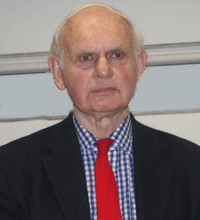|
Nourdin Bejjit: In an article published in the Southern African
Review celebrating the 30th anniversary of the AWS, you
explained how decisions about publishing books in the series were
taken when you were working for HEB. It seems that you conveyed
a sense of being the only man in charge of running the whole series.
Elsewhere you said that such decisions were shared between Henry
Chakava, Aig Higo and yourself, particularly after Chinua Achebe
resigned as a general editor of the series…
JC: Oh! But they were doing the same. You are quite right,
perhaps I didn’t make that strong enough. I am willing to
believe that for people to say that I took a pretty firm line. I
just had such massive material and I had to thin it down. Both Henry
and Aig were doing that as well. They were bringing in those manuscripts,
selecting them, and then sending them round, but because a lot of
the books were coming from Nigeria and Kenya, a lot of people did
not necessarily send the books to a company in Africa. Sometimes
they did. Nuruddin Farah sent his first manuscript to Aig in Ibadan
and he actually didn’t like what I had to say about it. I
did not know about this until a year or two later; it turned out
that he tried it again on me in London (laughs)…
Publishing is a subjective business as you get from Diana Athill
as well. The fact is that it is a lot of pressures on you…
not literally, of course… but you try and maintain some sort
of literary balance. The problem was not just a cultural problem.
It was part of the process of how much you accept what the author
does and how much you get them to re-write and how you encourage
them to re-write. Writing is a bloody lonely business, and so you
want to encourage writers. There were times when Henry Chakava and
I worked very hard, giving advice on a book by Thomas Akare called
The Slums, which was set in Kenya. When he got to the third
version, I began to worry that it was going to lose its freshness…
our intervention was actually possibly removing a lot of the originality
of this book. Henry and I thought “Well, we just had to go
ahead with him now”. We were both involved in encouraging
this person who just dropped in off the street with a hand-written
manuscript. I think the question you are asking me is absolutely
right: it is for you and for others to question how my cultural
values were affecting these writings…and because it was the
African Writers Series, which had a very educational purpose - even
though it was for a general market as well.
We did not do a deal on some of the books because we were bringing
in translations from Portuguese, Arabic, French and a few African
languages. We didn’t do much translating from one African
language to the other. Ngugi’s great contribution was to face
us with the problems of translation, which are not just linguistic,
but cultural as well. The way he told his stories in his later novels
were much more appropriate within the Gikuyu tradition. London and
New York based critics and advisors tended to say “Oh, he
used to write rather better” - this was their feeling - “When
he was in his Conradian phase.” Whereas, to me, it was fascinating
to see the body of Ngugi’s work and the way he was trying
to accommodate not just his audience. He would not only translate
his book, but got other people to do so. What he didn’t do
was re-write it for the Western, New York, British markets. We had
quite a lot of difficulty selling Petals of Blood in the
United States. It was turned down by Pantheon. The editor there
took on various people, like Marechera, but he didn’t think
he could sell Petals of Blood in the American market.
NB: Heinemann Educational Books is no longer publishing new
writings in the African Writers Series. Some say that it is dead.
As the ‘godfather’ of the series, how did you or do
you respond to the ‘end’ of this interesting publishing
adventure?
JC: I assume they are going on publishing the ones which
sell well. But in one way, the question which we haven’t touched
on is: Should it have died earlier? (Laughs) Well, it does
not really die; because copyright exists and it goes on. There is
a mechanical extension, but of course it is a different series,
a raddled series compared with what it used to be. The great thing
about it is that unlike other paperback series it went into publishing
new writing, and that was its great original drive and that’s
why it was so successful. Of course forty years is a hell of a long
time on a publishing scene. My successor, Vicky Unwin, was very
good at fighting the reactionary forces within Heinemann to maintain
a flow of good new writers, particularly new women coming on the
scene.
As to your question of whether I was imposing metropolitan, cultural,
neocolonial values on my colleagues in Africa, I think we were in
collusion. But what I think is disappointing is that there isn’t
a very strong literary publishing centre in either East or West
Africa. The crucial thing about publishing a lot of writers (talking
about novelists in particular) is that if the novel is set in the
country, there is obviously a built-in substantial audience because
people like local interests and novels. Some of the best of those
should appear in the international literary market place and get
circulated internationally. But that does not mean that the others
aren’t performing an equally interesting task of informing
and entertaining audiences in their own countries… this, in
particular, happened in Zimbabwe in recent years. Writers like Vera
were published locally and then sold to a publisher in the States.
When I left Heinemann in 1984, an extremely able chap called David
Godwin who was at that time an editor at Heinemann (he went on to
Jonathan Cape, published Ben Okri’s The Famished Road and then became an agent and made a success of several
Indian writers) said to me “Look, it is just distressful what
is happening at Heinemann Educational Books, come and have a talk
to me. William Heinemann has this proud historic record of publishing
African writers, we want to get the game started again.” He
and I were very keen on this… that we should really publish
African writers first and foremost for the British and American
hardback markets and sell to the middlebrow paperback markets like
Picador. It would have been much more appropriate for the African
Writers Series to become like Penguin, a reprint series, if it had
a lot of stuff to draw on. That would have been much healthier.
The African Writers Series gave people the excuse not to do ordinary
publishing. Africans came to us first and foremost and so we controlled
the rights, and hardback publishers needed to control the rights.
We did two books with Nuruddin Farah. He even felt rather guilty
when he told us that he had an agent, but Keith and I were absolutely
delighted because we wanted an agent to do what we were trying to
do, which was to interest other publishers… and his agent
then had some difficulty in getting the book, Sardines,
placed. He got it with Alison & Busby who were an enterprising,
small, general publisher. But since then he’s gone on and
he had a distinguished publishing record in both America and Britain.
That’s the way things were beginning to move. I think that
in many ways they have moved rather more in recent years. I know
that Macmillan may have started Macmillan African writers series
in recent months actually. 
Note: This is the last of a three-part interview
conducted by Nourdin Bejjit in August 2005 in Oxford, |
|
|
|
|











![]()
![]()
![]()
![]()


